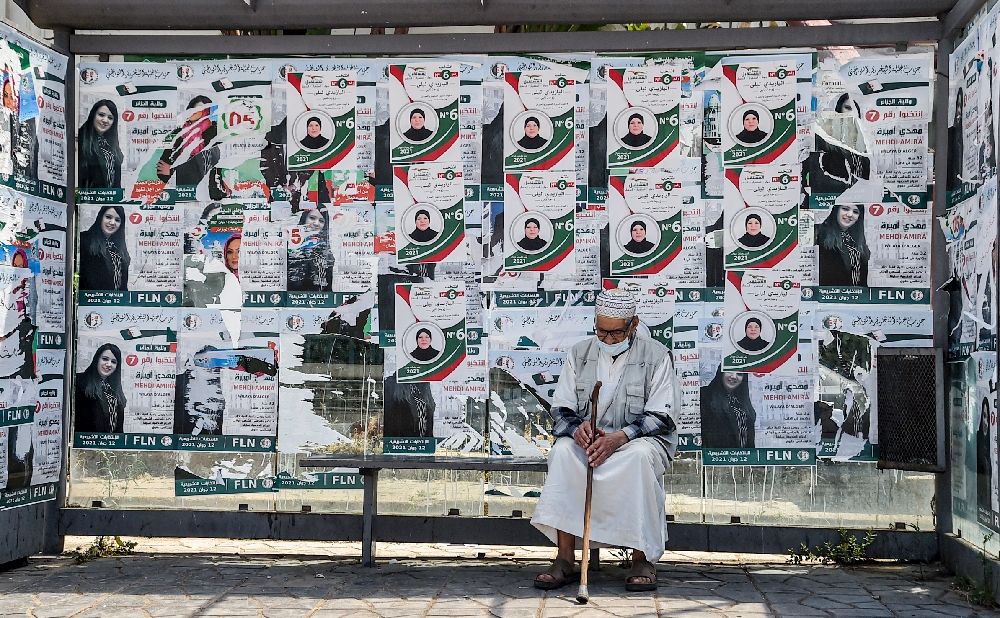Algerian police deployed heavily in the capital on Friday ahead of parliamentary elections to block protesters disrupting the polls, as activists criticised a “climate of repression” amid arrests of opposition figures.
Large numbers of police officers patrolled the streets of Algiers, blocking roads to preempt any attempt by supporters of the long-running Hirak pro-democracy movement to gather, AFP correspondents reported.
Saturday’s poll comes as authorities seek to bolster their legitimacy and take the wind out of the sails of the Hirak, which returned to the streets in February following an almost year-long break due to the coronavirus pandemic.
The Algerian League for the Defence of Human Rights said seven leading protest movement figures had been arrested on Thursday evening, five in Algiers and two elsewhere in the country.
“This repressive atmosphere and the restrictions placed on human rights and freedoms mean these elections have no democratic value,” its vice president Said Salhi told AFP, adding they did not know “the grounds for these arrests”.
Human Rights Watch warned Friday of a “frightening escalation of repression” in Algeria, noting “free expression is not a crime”.
‘Climate of terror’
Back in 2019, the Hirak mobilised hundreds of thousands to force longtime president Abdelaziz Bouteflika to resign after he launched a bid for a fifth term.
It has urged boycotts of all national votes since then.
A presidential election 18 months ago, won by Abdelmadjid Tebboune, attracted a turnout of less than 40 percent, even according to official figures.
Among those detained in Algiers were leading opposition figure Karim Tabbou and independent journalist Khaled Drareni, as well the director of a pro-reform radio station, Ihsane El Kadi.
Kadi’s journalist colleagues from Radio M and the Maghreb Emergent news site said they were “outraged by the climate of terror”.
Hirak opposes the elections “believing they represent nothing, come at a bad time and are not what Algeria needs,” Drareni told the France Info channel before his arrest.
Drareni was being held in a barracks on the outskirts of the capital. His only contact with his family was a 1:30 am phone call, his lawyer Zoubida Assoul said.
The journalist was only released on bail in February after being detained while covering a mass demonstration in the capital in March last year.
Tabbou and Ihsane El Kadi were being held in the same barracks, their lawyers said.
“These arrests mark a chilling escalation in the Algerian authorities’ clampdown on the rights to freedom of expression and association,” Amnesty International said in a statement, reporting over 200 people were in detention in connection with the Hirak movement.
“Instead of rounding up journalists and political opponents in a bid to crush dissent and intimidate members of the Hirak protest movement, Algeria’s authorities should focus on respecting their human rights obligations.”
Roadblocks
On Friday, security forces set up roadblocks on key routes into the capital, with police trucks parked at major junctions.
The streets were largely quiet – with many in the city heading to the beaches instead.
But in two towns in Algeria’s northeastern Kabylie region, Tizi Ouzou and Bejaia, hundreds of marchers chanted slogans saying the upcoming vote was flawed and accusing the current administration of links to Bouteflika.
Since last month, the government has clamped down on the weekly protests of the Hirak reform movement, detaining hundreds of activists who have defied new restrictions on public gatherings.
Prior approval is now required from the interior ministry, an impossible demand for a movement that prides itself on having no formal leadership, making all of its demonstrations effectively illegal.
A presidential decree published in the official gazette on Thursday opens a new avenue for the prosecution of Hirak activists by changing the penal code’s definition of acts of terrorism.
It establishes an official blacklist of individuals and entities suspected of terrorism that could be used against activists, opposition leaders or journalists.
“In Algeria, the authorities no longer pretend to organise serious elections,” Reporters Without Borders chief Christophe Deloire said on Twitter, criticising the arrest of Drareni and other Hirak members.
“Yesterday, President Tebboune broadened the notion of terrorism by decree to facilitate repression,” Deloire added.
Source: AFP
Picture: AFP


